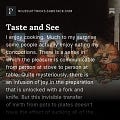I enjoy cooking. Much to my surprise some people actually enjoy eating my concoctions. There is a sense in which the pleasure is communicable from person at stove to person at table. Quite mysterious…
© 2024 Nojesuittricks
Substack is the home for great culture


